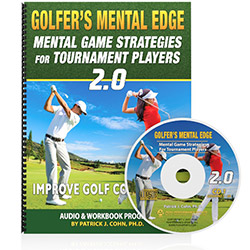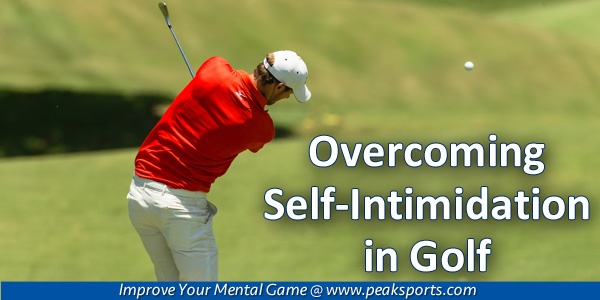How Does Self-Intimidation Affect Your Golf Game?
How well do you golf when you are playing in a tournament with golfers who have won significantly more tournaments and shoot consistently lower scores than you?
Playing with golfers who have significantly more wins may be intimidating for you.
This form of intimidation is self-generated.
That is to say that another golfer is not getting in your face trying to elicit a negative reaction from you.
Self-intimidation can drastically interfere with your ability to shoot a low score. Self-intimation can create so much anxiety that your body loses the ability to swing the club freely.
Self-intimidation divides your focus.
So instead of dedicating 100 percent of your focus to your game, you constantly have one eye on your opponents and their scores.
For example, only 30 golfers qualify for the Tour Championship including No. 11 seed Pat Perez. Perez had played great his rookie year when he arrived on the Tour and finished 40th on the money list in 2002.
Though Perez has maintained his full PGA Tour card throughout his 16 year career, he has never reached the Tour Championship until this year.
Perez has a mathematical shot at the FedEx Cup title, but many have dismissed his chances.
Perez doesn’t give himself a great chance to win either.
PEREZ: “All the top guys would have to play bad, which they haven’t done all year. So for them to all do it at once, and me win, it’s about the same odds as the Powerball.”
So what is an effective approach to overcome self-intimidation when playing golfers with more success in the sport?
There are 4 strategies you can utilize to overcome self-intimidation:
- Have manageable goals – When your expectations become too high, you will be excessively anxious. Instead, set manageable goals to help you focus on execution instead of outcomes.
- Realize the past does not dictate the present – Just because your opponents have won tournaments does not mean they will be exempt from mistakes, bad shots and poor rounds.
- Focus on playing well instead of winning – Since you cannot predict the future nor can you control the results of the tournament, focus on playing your best golf in the NOW. When you focus on your game in the present, you are better able to swing the club freely, let go of bad shots and play consistent golf.
- Focus on your successes not your opponent’s resume – You have your own success resume. When you focus on your successes and your strengths, your confidence grows and confidence breeds more success.
Of course it may be challenging to play against top ranked golfers or those who shoot low scores but the mental challenge of overcoming self-intimidation is greater than the physical challenge on this course.
Once you learn to deal with self-intimidation, you can play your best golf no matter who you play against.
How to Overcome Self-Intimidation:
The first step in overcoming self-intimidation is recognizing the warning signs when you begin to focus on your opponents and psyching yourself out.
Identify 3 indicators that feed your mental intimidation, such as:
- Focusing on your opponent’s score.
- Comparing yourself to your opponents.
- Mentally reciting your opponent’s results.
- Feeling anxious about playing against certain golfers.
Be aware of these signs, stop thinking about others and focus on your talents and strengths.
Golfer’s Mental Edge

What’s the big sign that your mental game is the weak link in your golf game? When you can’t play consistently as well as when you play a practice or casual round–or your range game is way better than your game on the course. If you suffer from lack of focus, low self-confidence, poor composure or other mental game obstacles on the course, you can’t reach your true potential in golf.
The Golfer’s Mental Edge 2.0 Audio and Workbook program is ideal for any amateur, collegiate, junior, and tour professional golfer.
Golf coaches and instructors would also be wise to teach “The Golfer’s Mental Edge 2.0” principles to their players. This program is perfect for any golfer who wants to improve performance and consistency by managing their mind better on the course.

